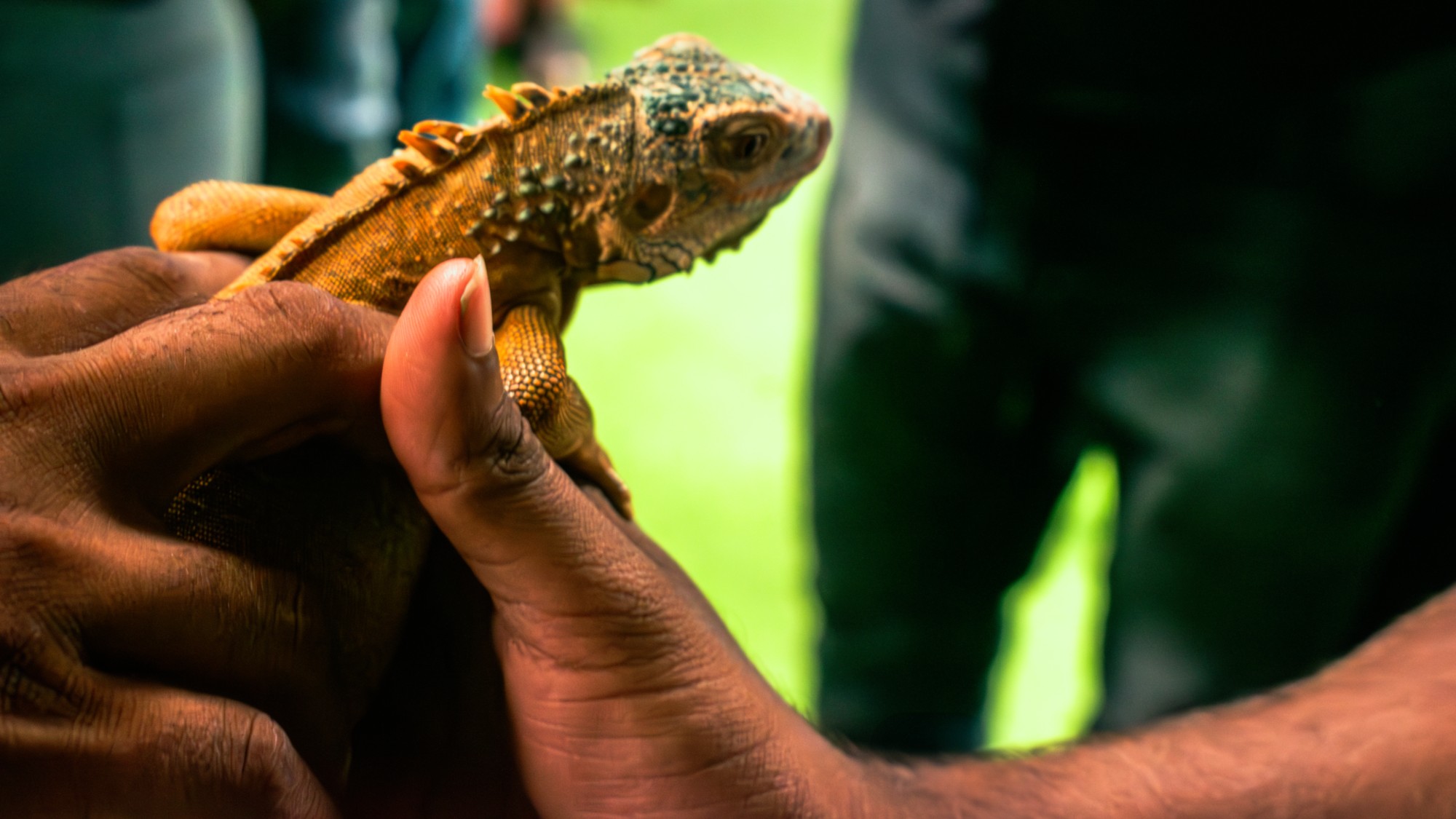Parthenogenesis: the miracle of 'virgin births' in the animal kingdom
Asexual reproduction, in which females reproduce without males by cloning themselves, has been documented in multiple species

A free daily email with the biggest news stories of the day – and the best features from TheWeek.com
You are now subscribed
Your newsletter sign-up was successful
In Telford's Exotic Zoo, life found a way.
A casque-headed iguana has given birth to eight babies at the Shropshire wildlife park – without any contact with a male, via a phenomenon called parthenogenesis.
"When we confirmed the eggs were fertile without any contact with a male, our jaws hit the floor," zoo owner Scott Adams told the BBC. "For us, it's a powerful reminder that life finds a way in the most unexpected circumstances."
The Week
Escape your echo chamber. Get the facts behind the news, plus analysis from multiple perspectives.

Sign up for The Week's Free Newsletters
From our morning news briefing to a weekly Good News Newsletter, get the best of The Week delivered directly to your inbox.
From our morning news briefing to a weekly Good News Newsletter, get the best of The Week delivered directly to your inbox.
What is parthenogenesis?
A type of asexual reproduction, in which females create offspring without fertilisation from male sex cells. The unfertilised eggs develop into embryos that are genetic clones of the mother. Basically, the female clones herself.
It actually predates sexual reproduction, which evolved to introduce more genetic variation. It's more common in plants or invertebrates than vertebrates – but it has been observed among fish, snakes, sharks, lizards, and even birds. What is "mind-boggling is that parthenogenesis isn't even that rare", said the Smithsonian Institution's National Museum of Natural History. It was first documented in Komodo dragons in 2006, but has since been seen in all "vertebrate lineages" except mammals.
"Komodos are famous for it," Colin Stevenson, head of education at Crocodiles of the World, told The Guardian. "They can reproduce normally, but every now and again, they pop out a parthenogenetic one. The trick is to work out what kicks it off."
Are there other cases?
In January, a baby swell shark, Yoko, was born in a Louisiana aquarium – although the two females in the tank "had not been in contact with a male in over three years", said a Shreveport Aquarium spokesperson. Yoko's birth could be the result of either parthenogenesis or delayed fertilisation – females of many shark species can store sperm inside themselves for months or even years.
A free daily email with the biggest news stories of the day – and the best features from TheWeek.com
Kevin Feldheim of Chicago's Field Museum told NPR that both explanations were possible, and that genetic testing on Yoko would be necessary to compare her to the sharks in the tank. But there have been documented cases of parthenogenesis involving more than half a dozen shark species, he said.
Recently, a new parthenogenetic species of spider was discovered in the Czech Republic. Dysdera parthenogenetica uses "thelytoky" parthenogenetic reproduction, in which "generations are formed by females arising from unfertilised eggs", said the study published in the Journal of Zoological Systematics and Evolutionary Research.
This species is similar to another, Dysdera hungarica, but when researchers put the two together, the parthenogenetic females refused to mate with males. They "did not respond to their courtship behaviour", said the study, and "their copulatory organs were reduced".
So what kicks it off?
"In general, we think parthenogenesis is a last-ditch effort for a female to pass on its genes, so when a female is isolated from conspecific males, she is able to undergo parthenogenesis," Feldheim told NPR.
"How parthenogenesis kicks in or what cues the females use to begin the process remains to be discovered."
What are the downsides?
Organisms born via parthenogenesis, known as parthenotes, "don't have the best track record when it comes to survivorship or fitness", said the Smithsonian. Every zebra shark parthenote has died before reaching sexual maturity. However, one female white-spotted bamboo shark not only survived to sexual maturity, but also gave birth through parthenogenesis.
Yoko is "thriving", said the aquarium, but shark pups born from rare reproductive events usually suffer health issues. "Should Yoko's time with us be brief, it will still leave an unforgettable legacy, contributing invaluable insights to the study of shark reproduction and conservation efforts."
Harriet Marsden is a senior staff writer and podcast panellist for The Week, covering world news and writing the weekly Global Digest newsletter. Before joining the site in 2023, she was a freelance journalist for seven years, working for The Guardian, The Times and The Independent among others, and regularly appearing on radio shows. In 2021, she was awarded the “journalist-at-large” fellowship by the Local Trust charity, and spent a year travelling independently to some of England’s most deprived areas to write about community activism. She has a master’s in international journalism from City University, and has also worked in Bolivia, Colombia and Spain.
-
 Bad Bunny’s Super Bowl: A win for unity
Bad Bunny’s Super Bowl: A win for unityFeature The global superstar's halftime show was a celebration for everyone to enjoy
-
 Book reviews: ‘Bonfire of the Murdochs’ and ‘The Typewriter and the Guillotine’
Book reviews: ‘Bonfire of the Murdochs’ and ‘The Typewriter and the Guillotine’Feature New insights into the Murdoch family’s turmoil and a renowned journalist’s time in pre-World War II Paris
-
 Witkoff and Kushner tackle Ukraine, Iran in Geneva
Witkoff and Kushner tackle Ukraine, Iran in GenevaSpeed Read Steve Witkoff and Jared Kushner held negotiations aimed at securing a nuclear deal with Iran and an end to Russia’s war in Ukraine
-
 Russia’s ‘cyborg’ spy pigeons
Russia’s ‘cyborg’ spy pigeonsUnder the Radar Moscow neurotech company with Kremlin-linked funding claims to implant neural chips in birds’ brains to control their flight, and create ‘bio-drones’
-
 How roadkill is a surprising boon to scientific research
How roadkill is a surprising boon to scientific researchUnder the radar We can learn from animals without trapping and capturing them
-
 The ocean is getting more acidic — and harming sharks’ teeth
The ocean is getting more acidic — and harming sharks’ teethUnder the Radar ‘There is a corrosion effect on sharks’ teeth,’ the study’s author said
-
 Cows can use tools, scientists report
Cows can use tools, scientists reportSpeed Read The discovery builds on Jane Goodall’s research from the 1960s
-
 A rat infestation is spelling trouble for the almond industry
A rat infestation is spelling trouble for the almond industryThe Explainer The infestation has affected at least 100,000 acres in California
-
 Rabbits with 'horns' sighted across Colorado
Rabbits with 'horns' sighted across Coloradospeed read These creatures are infected with the 'mostly harmless' Shope papilloma virus
-
 Scientists discover cause of massive sea star die-off
Scientists discover cause of massive sea star die-offSpeed Read A bacteria related to cholera has been found responsible for the deaths of more than 5 billion sea stars
-
 'Thriving' ecosystem found 30,000 feet undersea
'Thriving' ecosystem found 30,000 feet underseaSpeed Read Researchers discovered communities of creatures living in frigid, pitch-black waters under high pressure